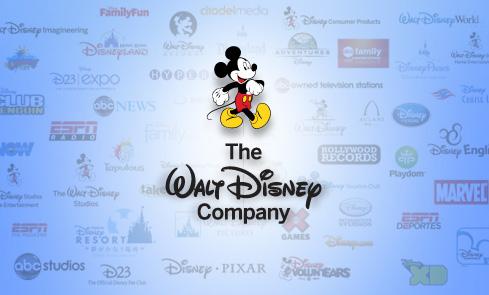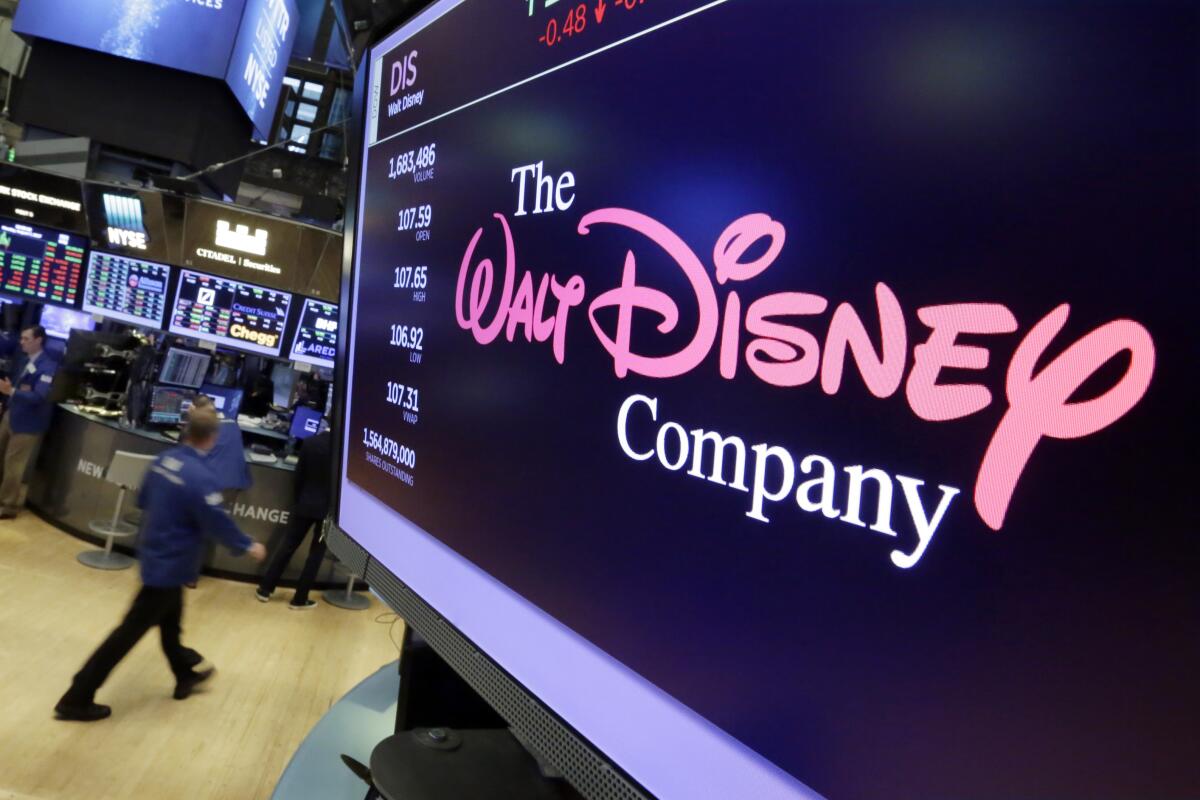Deutsche Bank Sees Attractive Opportunity for Walt Disney in H2/2023

Deutsche Bank analysts raised their price target for Walt Disney (NYSE:DIS) shares from $130 to $135, maintaining a Buy rating on the stock. According to the analysts’ note, the firm foresees an attractive opportunity for Disney in the second half of 2023, with several factors poised to drive stock appreciation in the back half of the company's fiscal year.
The firm anticipates an inflection point for earnings growth in Q3, propelled by year-over-year margin improvement in DMED (Entertainment) and continued strong revenue growth and margin expansion in DPEP (Parks & Consumer Products).
The analysts also expect cost reduction initiatives to drive loss improvement in Streaming during the June and September quarters, resulting in smaller year-over-year operating income declines in Linear Networks.
Overall, the analysts estimate that 2023 will be the trough for DMED profit, as Linear Networks operating income is projected to decline by more than Streaming operating loss improves, despite 2022 being the peak year for Streaming losses.
| Symbol | Price | %chg |
|---|---|---|
| FILM.JK | 3770 | -0.53 |
| MSIN.JK | 488 | 0.41 |
| 352820.KS | 279500 | -0.89 |
| CNMA.JK | 141 | 1.42 |

Disney Raises EPS Outlook As ESPN Announces WWE-Focused Streaming Platform
Walt Disney (NYSE:DIS) raised its full-year adjusted earnings per share guidance after announcing a new streaming service from its ESPN division set to launch on August 21.
The direct-to-consumer platform, priced at $29.99 per month, will serve as the exclusive home for WWE events. It will also feature major professional and collegiate sports coverage—including the NFL, MLB, and NBA—alongside popular programs like "SportsCenter" and "Pardon the Interruption."
The move aligns with Disney’s broader strategy to expand its presence in the competitive streaming landscape as consumer preferences shift away from traditional cable.
CEO Bob Iger described the ESPN platform, recent NFL-related initiatives, and the planned integration of Hulu into Disney+ as "major steps" in the company’s streaming evolution.
During the fiscal third quarter, Disney+ subscriber numbers increased 1.4% quarter-over-quarter to 127.8 million, slightly below Bloomberg estimates of 127.97 million. The company expects subscriber growth to continue at a modest pace in the current quarter.
Iger also highlighted continued expansion plans across the company’s global theme parks and cruise operations.

Guggenheim Boosts Disney Target, Highlights Cost Efficiencies and DTC Strategy
Guggenheim raised its price target on Walt Disney (NYSE:DIS) to $140 from $120 while maintaining a Buy rating, pointing to stronger operating leverage, improving advertising trends, and a clearer path to unified direct-to-consumer (DTC) growth.
The analysts cited refined expectations for Disney’s Linear Networks, which are benefiting from cost efficiencies and the Star India divestiture, helping reduce expenses. Although recent films like Elio and Thunderbolts have underperformed modestly at the box office, Sports advertising revenue came in stronger than forecast thanks to robust aggregate viewership during the seven-game NBA Finals series.
Disney’s Experiences segment is also seeing resilient attendance and travel trends, supporting earnings stability. Additionally, the analysts emphasized that Disney’s upcoming full control of Hulu—secured with a $439 million payment to Comcast due by July 24—will enable the company to implement a unified DTC strategy. This includes bundling opportunities with Disney+, Hulu, and the forthcoming ESPN streaming service to drive incremental revenue.
Guggenheim now expects third-quarter total segment operating income (OI) of $4.5 billion, up from $4.4 billion previously, and has lifted its full-year segment OI forecast to $17.7 billion—just ahead of the $17.65 billion consensus. The updated outlook reflects Disney’s improving cost profile and growing momentum in streaming, supporting continued upside potential.

Guggenheim Boosts Disney Price Target to $140, Sees Stronger Profit and DTC Momentum
Guggenheim raised its price target on Walt Disney (NYSE:DIS) to $140 from $120 while maintaining a Buy rating, citing improved operating forecasts, resilient theme park trends, and a clearer path to direct-to-consumer (DTC) growth.
The firm updated its model to reflect several positives, including lower operating expenses at Linear Networks thanks to the Star India divestiture and ongoing cost efficiencies. While recent films like Elio and Thunderbolts underperformed modestly at the box office, Sports advertising revenue is tracking better than expected, buoyed by overall audience growth during the NBA Finals.
Meanwhile, Disney’s Experiences division continues to show resilient attendance and travel demand, supporting earnings stability.
Guggenheim highlighted Disney’s upcoming full ownership of Hulu—secured with a $439 million payment to Comcast due by July 24—as a catalyst for advancing its unified DTC strategy. This includes integrating Hulu with Disney+ and the upcoming ESPN streaming service, creating new bundling opportunities to boost revenue.
The analysts now forecast fiscal Q3 segment operating income of $4.5 billion, up from $4.4 billion previously, lifting full-year segment operating income to $17.7 billion—slightly ahead of the $17.65 billion Street consensus. The updated outlook reinforces Disney’s potential for sustainable profit growth and stronger competitive positioning in streaming.

The Walt Disney Company (NYSE:DIS) Stock Price Target and Financial Performance Overview
- Michael Morris from Guggenheim sets a price target of $120 for Disney stock, indicating a potential upside of about 14.13%.
- Bank of America analyst Jessica Reif Ehrlich has a more optimistic view with a price target of $140, based on Disney's robust financial performance.
- Despite economic challenges, Disney's theme parks and streaming services show strong performance, with future bookings data remaining strong.
The Walt Disney Company (NYSE:DIS) is a global entertainment giant known for its theme parks, movies, and streaming services. On May 8, 2025, Michael Morris from Guggenheim set a price target of $120 for Disney stock, which was trading at around $105.15. This suggests a potential upside of about 14.13% from its current price.
Disney has shown resilience in a challenging economic climate, with strong performance in its parks and streaming services. Following its first-quarter results, Disney raised its guidance, indicating confidence in its future. Bank of America analyst Jessica Reif Ehrlich reiterated a Buy rating, setting a price target of $140, as highlighted by the company's robust financial performance.
Despite lowering the price target from $130 to $120, Guggenheim's Michael Morris maintained a Buy rating. Needham analyst Laura Martin also upheld a Buy rating with a $125 price target. Disney's recent quarter exceeded expectations in revenue, operating income, earnings per share, and free cash flow, as noted by Ehrlich.
Disney's decision to raise its full-year earnings per share is encouraging, especially amid recent macroeconomic volatility. Although the company did not increase its fiscal year 2025 guidance for its Experiences segment, future bookings data remains strong. Walt Disney World bookings are up 4% in the third quarter and 7% in the fourth quarter.
Currently, Disney's stock is priced at $105.16, reflecting a 3% increase or $3.07. The stock has fluctuated between a low of $103.86 and a high of $106.19 today. Over the past year, Disney's stock has reached a high of $118.63 and a low of $80.10. The company's market capitalization is approximately $190.1 billion, with a trading volume of 16,792,922 shares on the NYSE.

The Walt Disney Company (NYSE:DIS) Stock Price Target and Financial Performance Overview
- Michael Morris from Guggenheim sets a price target of $120 for Disney stock, indicating a potential upside of about 14.13%.
- Bank of America analyst Jessica Reif Ehrlich has a more optimistic view with a price target of $140, based on Disney's robust financial performance.
- Despite economic challenges, Disney's theme parks and streaming services show strong performance, with future bookings data remaining strong.
The Walt Disney Company (NYSE:DIS) is a global entertainment giant known for its theme parks, movies, and streaming services. On May 8, 2025, Michael Morris from Guggenheim set a price target of $120 for Disney stock, which was trading at around $105.15. This suggests a potential upside of about 14.13% from its current price.
Disney has shown resilience in a challenging economic climate, with strong performance in its parks and streaming services. Following its first-quarter results, Disney raised its guidance, indicating confidence in its future. Bank of America analyst Jessica Reif Ehrlich reiterated a Buy rating, setting a price target of $140, as highlighted by the company's robust financial performance.
Despite lowering the price target from $130 to $120, Guggenheim's Michael Morris maintained a Buy rating. Needham analyst Laura Martin also upheld a Buy rating with a $125 price target. Disney's recent quarter exceeded expectations in revenue, operating income, earnings per share, and free cash flow, as noted by Ehrlich.
Disney's decision to raise its full-year earnings per share is encouraging, especially amid recent macroeconomic volatility. Although the company did not increase its fiscal year 2025 guidance for its Experiences segment, future bookings data remains strong. Walt Disney World bookings are up 4% in the third quarter and 7% in the fourth quarter.
Currently, Disney's stock is priced at $105.16, reflecting a 3% increase or $3.07. The stock has fluctuated between a low of $103.86 and a high of $106.19 today. Over the past year, Disney's stock has reached a high of $118.63 and a low of $80.10. The company's market capitalization is approximately $190.1 billion, with a trading volume of 16,792,922 shares on the NYSE.

Disney Soars 10% After Q2 Earnings Beat and Strong 2025 Profit Outlook
The Walt Disney Company (NYSE:DIS) shares jumped over 10% intra-day today after the company reported stronger-than-expected fiscal second-quarter results and issued an upbeat full-year profit forecast, easing investor concerns about macroeconomic uncertainty and tariff-related pressures.
Adjusted earnings per share came in at $1.45, well above the $1.20 analyst estimate and up from $1.21 in the same quarter last year. Revenue grew 7% to $23.62 billion, surpassing forecasts of $23.05 billion.
Disney’s total segment operating income rose 15% to $4.44 billion, driven by strong performance in its entertainment division, particularly boosted by a rebound in Disney+ subscriber growth. Gains in the parks and experiences segment also helped offset weakness in the sports business, where rising programming and production costs, tied to expanded football coverage, weighed on profitability.
Looking ahead, Disney expects full-year adjusted earnings per share of $5.75—comfortably above the $5.44 consensus. The guidance reflects management’s confidence in streaming momentum, resilient consumer demand at its theme parks, and continued operational discipline across the business.

Disney Soars 10% After Q2 Earnings Beat and Strong 2025 Profit Outlook
The Walt Disney Company (NYSE:DIS) shares jumped over 10% intra-day today after the company reported stronger-than-expected fiscal second-quarter results and issued an upbeat full-year profit forecast, easing investor concerns about macroeconomic uncertainty and tariff-related pressures.
Adjusted earnings per share came in at $1.45, well above the $1.20 analyst estimate and up from $1.21 in the same quarter last year. Revenue grew 7% to $23.62 billion, surpassing forecasts of $23.05 billion.
Disney’s total segment operating income rose 15% to $4.44 billion, driven by strong performance in its entertainment division, particularly boosted by a rebound in Disney+ subscriber growth. Gains in the parks and experiences segment also helped offset weakness in the sports business, where rising programming and production costs, tied to expanded football coverage, weighed on profitability.
Looking ahead, Disney expects full-year adjusted earnings per share of $5.75—comfortably above the $5.44 consensus. The guidance reflects management’s confidence in streaming momentum, resilient consumer demand at its theme parks, and continued operational discipline across the business.







